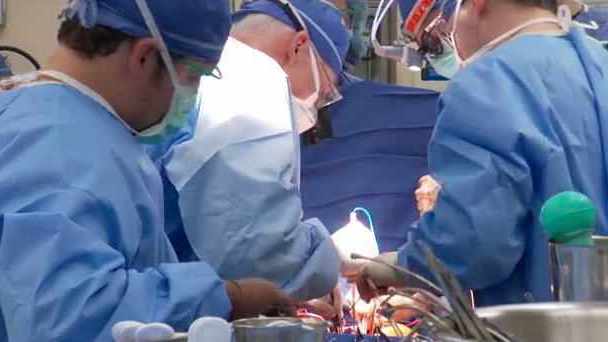-
Cardiovascular
Reverse-order heart-liver transplant helps prevent rejection for highly sensitized patients

ROCHESTER, Minn. — All too often, patients with high levels of antibodies face major challenges getting a transplant. These highly sensitized patients have a much higher risk of death while waiting for suitable organs they are less likely to reject. But there is new hope for highly sensitized patients in need of a combined heart and liver transplant, thanks to an innovative surgical approach at Mayo Clinic.
Traditionally, surgeons transplant the heart first, followed by the liver. But Mayo Clinic heart transplant team decided to reverse the order for highly sensitized patients in the hopes that the liver would absorb some of the patient's antibodies, removing them from circulation and lowering the risk of antibody-mediated rejection. The strategy worked, according to a study recently published in the Journal of the American College of Cardiology.
"This unique approach to heart-liver transplant opens the door to more highly sensitized patients getting the transplants they desperately need," says Sudhir Kushwaha, M.D., a Mayo Clinic cardiologist and the study's senior author.
More than 107,000 people in the U.S. are on the waitlist for a lifesaving transplant, according to the Organ Procurement and Transplantation Network. An estimated 20% of people waiting for a transplant are highly sensitized, meaning they have high antibody levels that can cause the immune system to reject a transplanted organ. People can become sensitized due to blood transfusions, pregnancies and previous transplants. April is National Donate Life Month, which encourages people to register to be organ, eye and tissue donors, and honor those who have given the gift of life.
The Mayo Clinic team was inspired to try the heart-after-liver transplant procedure after noting that patients who had undergone a traditional heart-liver transplant were much less likely to experience rejection than those who had a heart transplant alone. Previous research has shown a similar phenomenon for patients undergoing a simultaneous kidney-liver transplant.
Mayo Clinic began offering the pioneering heart-after-liver transplant surgery in 2011. The recently published study reviews the outcomes for seven patients who underwent the procedure. The patients were ages 33–51, and six of the seven were women. All experienced a significant drop in antibodies after the procedure was performed, and none of the patients had experienced rejection within four years following surgery. The study's limitations include its small sample size and younger age of typical transplant patients.
While this new procedure is promising, it comes with major challenges. The heart is usually transplanted first because it is more time-sensitive than other organs. The reverse-order procedure requires a complex choreography between the heart and liver transplant teams to accomplish the procedure.
"Timing is everything. These surgeries require the heart and liver transplant teams to work closely together to limit the time it takes to transplant the donated organs," says Richard Daly, M.D., a Mayo Clinic cardiothoracic surgeon and the paper's first author.
Additional research is needed to see whether transplanting a portion of a donor's liver would offer the same protective benefit for highly sensitized heart transplant patients. A recent editorial in the Journal of the American College of Cardiology concludes that heart-after-liver transplant surgery "could potentially increase the number of highly sensitized patients who undergo successful transplantation, shorten their waiting times, and clarify our understanding of how to improve tolerance and outcomes in all transplant recipients."
The study's other co-authors ― all of Mayo Clinic ― are Andrew Rosenbaum, M.D.; Joseph Dearani, M.D.; Alfredo Clavell, M.D.; Naveen Pereira, M.D.; Barry Boilson, M.D.; Robert Frantz, M.D.; Atta Behfar, M.D., Ph.D.; Shannon Dunlay, M.D.; Richard Rodeheffer, M.D.; Timucin Taner, M.D., Ph.D.; Manish Gandhi, M.D.; Julie Heimbach, M.D.; Charles Rosen, M.D.; and Brooks Edwards, M.D. The authors report no conflicts of interest.
###
About Mayo Clinic
Mayo Clinic is a nonprofit organization committed to innovation in clinical practice, education and research, and providing compassion, expertise and answers to everyone who needs healing. Visit the Mayo Clinic News Network for additional Mayo Clinic news.
Media contact:
- Heather Carlson Kehren, Mayo Clinic Public Affairs, newsbureau@mayo.edu







